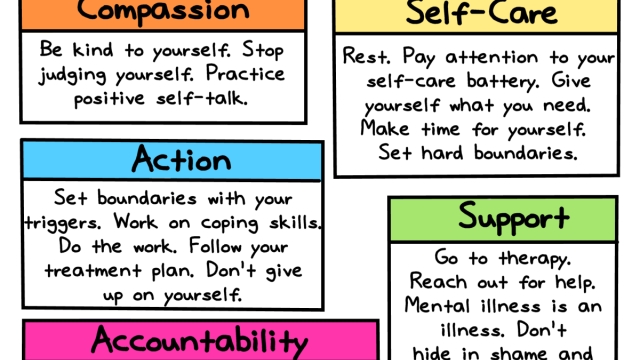Unlocking Healing: Exploring the Power of Therapy Training
In our modern world, the importance of mental health care cannot be overstated. As our understanding of mental health evolves, so does the need for skilled professionals who can provide effective therapy. This is where therapy trainings play a crucial role. These trainings serve as a key resource in unlocking the healing potential within individuals, allowing them to navigate through the complexities of their emotions in a supportive and empowering manner.
Therapy trainings provide a comprehensive foundation for those interested in pursuing a career in mental health care. They offer a structured curriculum that equips aspiring therapists with the necessary knowledge and skills to address a wide range of mental health concerns. The trainings explore various therapeutic techniques, theories, and approaches, enabling future therapists to tailor their interventions to meet the unique needs of each client they encounter.
By delving into the world of therapy trainings, individuals embark on a transformative journey of self-discovery and personal growth. Throughout these trainings, aspiring therapists gain a deeper understanding of their own thoughts, feelings, and behaviors, which ultimately enhances their ability to empathize with and connect with others. This sense of self-awareness serves as a powerful tool in building trust and fostering a therapeutic alliance, enabling therapists to create a safe space for their clients to share and explore their vulnerabilities.
Furthermore, therapy trainings go beyond theoretical knowledge by offering practical experiences and opportunities for supervised practice. These hands-on experiences allow trainees to apply the techniques they have learned in a supervised and supportive environment. This invaluable aspect of therapy trainings helps aspiring therapists develop their own unique therapeutic style and gain confidence in their abilities to facilitate healing and growth.
In conclusion, therapy trainings have a profound impact on the world of mental health care. They mold individuals into skilled and compassionate therapists who possess the necessary tools to unlock healing within their clients. Through a combination of theoretical learning, self-reflection, and supervised practice, therapy trainings empower aspiring therapists to embark on a rewarding journey of facilitating positive change, one session at a time.
Types of Therapy Trainings
In the field of mental health care, therapy trainings play a crucial role in equipping professionals with the necessary tools and techniques to help individuals overcome various challenges. These trainings can be categorized into different types, each with its own focus and approach. Let’s explore some of the common types of therapy trainings:
Cognitive Behavioral Therapy (CBT) Training: CBT is a widely recognized and researched form of therapy that focuses on identifying and changing negative thoughts and behaviors. Training in CBT equips therapists with the skills to help individuals challenge and reframe their beliefs, leading to more positive and adaptive thinking patterns.
Solution-Focused Brief Therapy (SFBT) Training: SFBT is a goal-oriented therapy that emphasizes finding solutions rather than dwelling on problems. Therapists trained in SFBT learn techniques to guide individuals in setting achievable goals and working towards them, focusing on their strengths and resources rather than deficits.
Psychodynamic Therapy Training: Psychodynamic therapy explores the unconscious processes and past experiences that influence an individual’s thoughts, emotions, and behaviors. Training in this approach enables therapists to help clients gain insight into these underlying dynamics and make significant changes in their lives.
These are just a few examples of therapy trainings that mental health professionals can pursue to enhance their skills and effectively support individuals in their therapeutic journey. Different types of therapy trainings offer diverse perspectives and strategies, allowing therapists to tailor their approach to best fit the unique needs of each client.
Benefits of Therapy Trainings
Therapy trainings hold immense benefits for mental health care practitioners. Through these trainings, professionals can enhance their skills, gain a deeper understanding of therapeutic techniques, and cultivate empathy and compassion towards their patients.
Firstly, therapy trainings offer a platform for professionals to refine their skills and expand their knowledge. These trainings often cover various therapeutic approaches, such as cognitive-behavioral therapy, psychodynamic therapy, and mindfulness-based therapy. By learning different techniques, therapists can tailor their interventions to suit the unique needs of their patients, leading to more effective treatment outcomes.
Secondly, participating in therapy trainings allows professionals to delve into the intricacies of mental health care. These trainings provide opportunities to learn about the latest research and developments within the field. By staying updated, therapists can integrate evidence-based practices into their treatment plans and offer more contemporary and effective care to their patients.
Lastly, therapy trainings nurture empathy and compassion in mental health care providers. Through interactive workshops, reflective exercises, and case studies, therapists develop a better understanding of the challenges faced by individuals seeking therapy. This understanding aids in fostering stronger therapeutic relationships and creates a safe and supportive environment for clients to explore their mental health concerns.
In conclusion, therapy trainings provide mental health care professionals with valuable benefits in their practice. These trainings foster skill enhancement, knowledge expansion, and empathy development, ultimately resulting in improved client outcomes. Investing in therapy trainings is a worthwhile endeavor for professionals seeking to unlock the full healing potential of psychotherapy.
Challenges in Therapy Trainings
Training to become a therapist can be a rewarding journey, but it is not without its fair share of challenges. In this section, we will explore some of the common hurdles that individuals often encounter during therapy trainings.
Time Commitment:
Therapy trainings require a significant investment of time. Many training programs have extensive curriculum and clinical hours that students must fulfill. Balancing these demands alongside personal responsibilities and other commitments can be a considerable challenge for aspiring therapists.Emotional Intensity:
Working in the field of mental health care exposes therapy trainees to various emotional experiences. During their training, future therapists encounter clients with diverse backgrounds and often face difficult and sensitive topics. Processing these emotional encounters can be emotionally draining and intimidating, making it vital for trainees to develop effective self-care strategies.
Try It OutSkill Development:
Developing therapeutic skills is a crucial aspect of therapy trainings. However, acquiring and mastering these skills can be challenging. Trainees must learn to navigate different therapeutic approaches, techniques, and modalities. They need to practice effective communication, active listening, and empathy, which often requires time, patience, and dedicated effort.

In conclusion, therapy trainings present a set of challenges that aspiring therapists must overcome. The time commitment, emotional intensity, and skill development required in these trainings demand dedication and resilience. However, by acknowledging and addressing these challenges, trainees can equip themselves with the necessary tools to become competent and compassionate mental health professionals.





